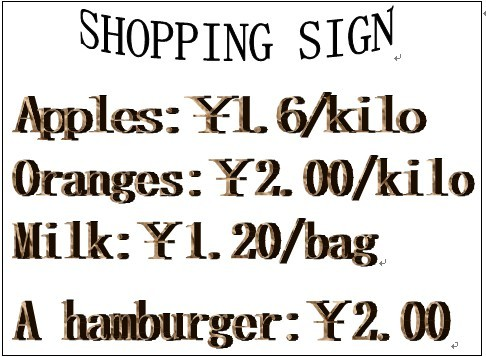
 | Xiao Shenyang was born in 1981 in Liaoning, China. He became famous after taking part in the CCTV Spring Festival Gala. He became a student of Zhao Benshan, a famous comedy actor, in 2006. He is good at Er Ren Zhuan, a popular folk (民间的) song-and-dance duet in northeast China. Many people enjoy his Er Ren Zhuan performances. |
 | Can you find a ring in an egg? But Liu Qian, a well-known magician(魔术师) from Taiwan, found it in front of the audiences at 2009 CCTV Spring Festival Gala. Liu Qian was born in 1976. At the age of 12, he won Taiwan’s Youth Magic Competition. To make his performance better, he often performed on streets, roads and other places for people. |
 | Jackie Chan was born on April 7, 1954. His parents called him “Chan Kongsang”, which means “born in Hong Kong”. In the early 1980s, Jackie went to Hollywood. Today, he is well- known all over the world. Many people like his action movies very much. |


科目:初中英语 来源: 题型:单选题
查看答案和解析>>
科目:初中英语 来源: 题型:单选题
查看答案和解析>>
科目:初中英语 来源: 题型:阅读理解
查看答案和解析>>
科目:初中英语 来源: 题型:阅读理解
HOW DO YOU GET A LIBRARY CARD?
* Anyone who lives, works or studies in the city can borrow books from the library free of charge.
* You need to show proof (证明) of your name and address.
* You need to complete application form.
* If you are under 18, you must ask a parent to fill in the form.
* You will receive a library card, which you can use immediately.
* You can use it at all Happy City public libraries in the city.
USING YOUR LIBRARY CARD
* You must always have your card to borrow books from the library.
* Please tell the library immediately if you lose your card. You are responsible for any books that are borrowed on your card until you report it to the library. You must pay to get a new card.
HOW DO YOU RETURN BOOKS?
* You can return books to any one of our libraries no matter where you
| Maximum Number of Books (最大限量) | Loan period (借出期限) | Number of Renewals (更换) |
| 10 books | 30 days | 2 |
| 4 magazines | 14 days | 1 |
| 2 cassettes | 30 days | 2 |
| 4 foreign language books | 30 days | 2 |
| 5 literacy (识字) books | 30 days | 2 |
Notice: You can borrow no more that 4 books on any one subject.
HOW DO YOU RENEW BOOKS?
You can renew (续借) books in person, by telephone or by using the Internet. You can go to any Happy City Public Library to renew books, no matter where you borrowed them
查看答案和解析>>
科目:初中英语 来源: 题型:阅读理解

查看答案和解析>>
科目:初中英语 来源: 题型:阅读理解
查看答案和解析>>
科目:初中英语 来源: 题型:阅读理解
查看答案和解析>>
湖北省互联网违法和不良信息举报平台 | 网上有害信息举报专区 | 电信诈骗举报专区 | 涉历史虚无主义有害信息举报专区 | 涉企侵权举报专区
违法和不良信息举报电话:027-86699610 举报邮箱:58377363@163.com